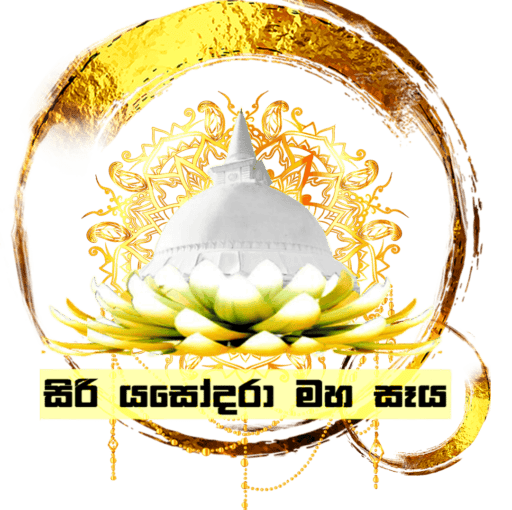"Keeping precepts even for a small duration will provide benefits."
The Deer-Hunter
Peta Vatthu 3.7 | Migaluddaka Sutta
Man:
You are young and surrounded by male and female deities. You look very happy with all the pleasures that you have. But in the daytime, you experience very painful feelings. What did you do in your previous life?
Ghost:
I was a cruel deer hunter living in the city of Rajagaha. I was always looking for something to kill. I did not have any pity on innocent beings.
I had a friend who was very compassionate, a disciple of the Supreme Buddha. He always said, “Do not do evil deeds my friend; do not be reborn in a bad world. If you wish to go to a happy world after death, then stop killing living beings.”
I did not listen to his advice because I took pleasure in killing and was very foolish.
My friend again advised me saying “If you must kill in the daytime, then please at least stop killing at night.”
So I killed living beings in the daytime and stopped during the night.
That is why I enjoy heavenly pleasures at night, but in the day, dogs come and tear off my flesh.
Even though I only restrained from killing at night, I still gained good results from it. Now I imagine the disciples of the Supreme Buddha who practice the Dhamma diligently throughout their lives surely will attain the supreme bliss of Nibbana.
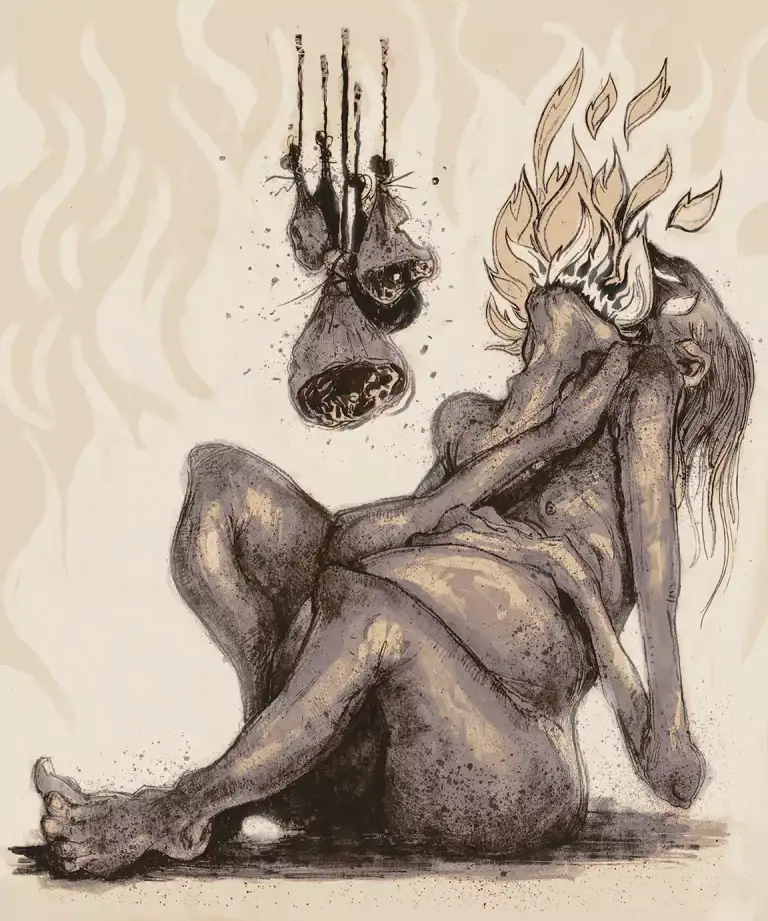
-
Save
"Taking the life of another will only lead to suffering."
A Second Deer Hunter
Peta Vatthu 3.8 | Dutiya Migaluddaka Sutta
Man:
In a multi-story mansion you rest on your very comfortable couch, listening to the sweet music of instruments. But at the end of the night before sunrise, you walk towards the cemetery where you experience very painful feelings. What evil deed have you committed by body, speech, or mind that you suffer like this?
Ghost:
In the city of Rajagaha, I was a hunter who was very cruel and had no self-control. I had a very kind friend who was a lay follower of the Supreme Buddha. He felt pity for me and kept advising me again and again, saying, “Do not do bad deeds my friend; do not be reborn in a bad world. If you wish to be reborn in a good world, then stop yourself from killing living beings.
I did not listen to his advice because I took pleasure in killing and was very foolish.
My friend who felt sorry for me advised me again saying, “If you have to kill living beings in the daytime, then please stop yourself from doing so at night.”
So I killed living beings during the daytime and stopped during the night. Because of this, I enjoy heavenly pleasures during the night and during the day, dogs come and eat me.
Even though I only restrained myself from killing at night, I still gained good results from it. Now I imagine the disciples of the Supreme Buddha who practice the Dhamma diligently throughout their lives will surely attain the supreme bliss of Nibbana.
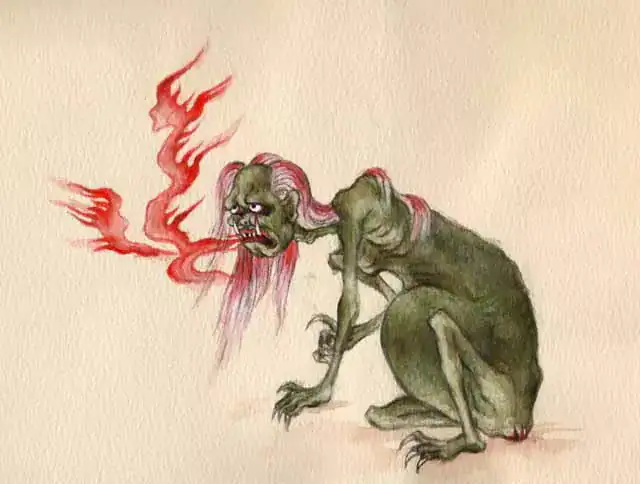
-
Save
"What are the dangers of lying, gossip and divisive speech?"
The Back Biter
Peta Vatthu 3.9 | Kūṭavinicchayika Sutta
Narada Bhante:
You are wearing many garlands, a crown, and many other types of jewelry on your hands and legs. Your body is covered with sandalwood cream. Your facial expression is very pleasant and your body shines very brightly just like the sun.
You are surrounded by ten thousand divine maidens who serve you whatever you want.
They wear bracelets and have golden wreaths on their heads. You look very mighty and your appearance is very majestic. When people look at you they are stunned by your appearance and their body hairs stand on end.
But you eat the flesh off your own back. What evil deed have you committed by body speech or mind to make you eat your own flesh?
Ghost:
When I was living in the human world I lied, broke friendships using divisive words, cheated others, and did lots of cunning deeds. In the middle of large gatherings of people, when I was asked to tell the truth, I lied.
I insulted others behind their backs. As a result of speaking behind others backs, today I have to eat the flesh off my own back.
You have seen how I am suffering, Narada Bhante. Now I see the truth of the words of the wise and compassionate Buddhas. I can tell you now, do not break friendships, do not tell lies, and may you not have to eat the flesh off your own back like I do!
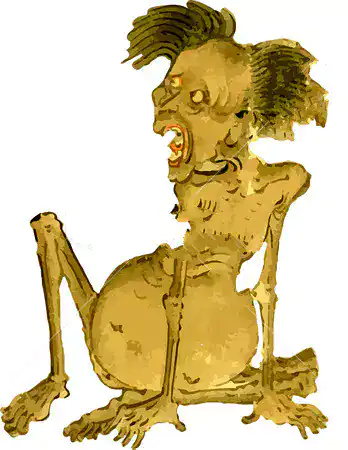
-
Save
"Insulting those who worship the Buddha's relics will only bring suffering."
Insulting the Relics Puja
Peta Vatthu 3.10 | Dhātuvivaṇṇaka Sutta
Monk:
While you are floating in the air, a bad smell comes out of you. Worms are eating your mouth. What evil deed did you do in your previous life?
Afterwards, a group of ghosts slice your mouth with knives. They slice again and again placing salt on the wounds. What evil deed did you commit by body, speech, or mind in your previous life? What is that the result of?
Ghost:
In the city of Rajagaha I was an extremely wealthy person. One day my wife, daughter, and daughter-in-law were ready to go to worship a stupa that held relics of the Buddha. They had prepared lotus flowers, garlands made of flowers, and incense. I stopped them from going there. That was the evil deed I did.
There are about eighty-six thousand ghosts here suffering each in their own way. They all committed the same evil deed of insulting the worshipping of the Buddha’s relics. We are suffering intensely in this ghost world as if we were in hell.
If one criticizes worshipping the relics of the Supreme Buddha, that person loses a great meritorious opportunity.
Look at those female deities travelling in the sky, decorated with garlands and flowers. They enjoy this great happiness as a result of offering flowers to the relics of the Supreme Buddha. Having seen this marvelous, amazing, and hair raising result of merit, wise people salute and pay homage to the great sage, the Buddha.
When I am released from this ghost world and reborn in the human world, I will diligently worship again and again the stupas of the relics of the Supreme Buddha.
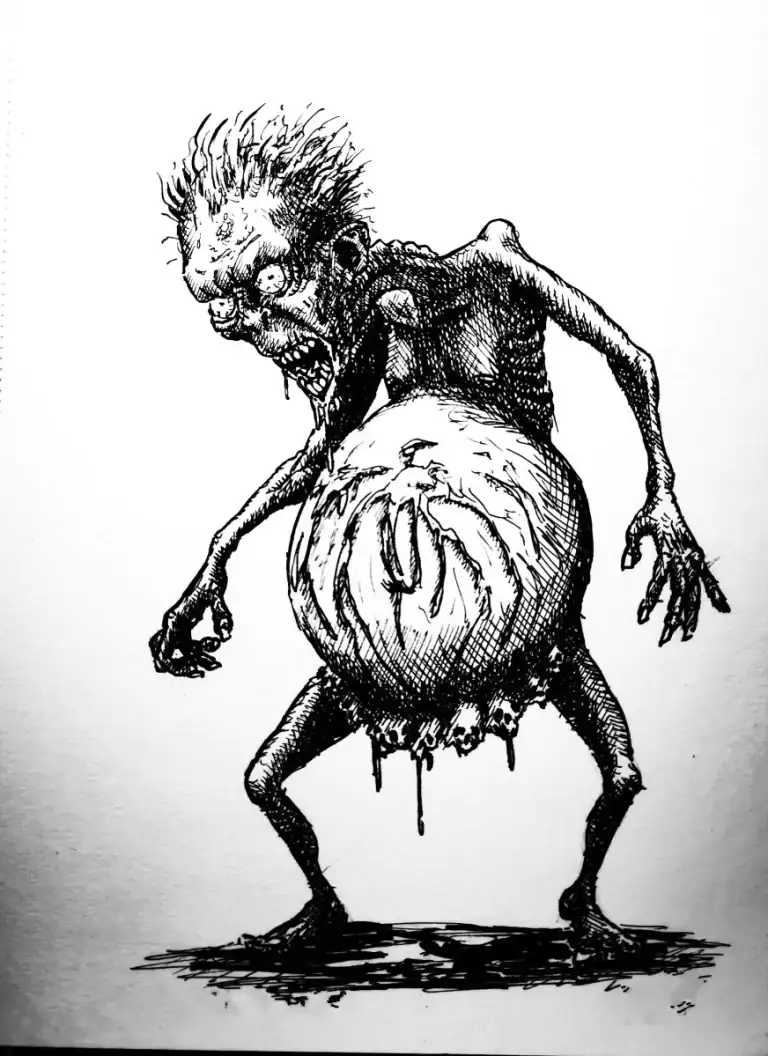
-
Save
"How does one escape from the path leading to hell?"
King Ambasakkhara
Peta Vatthu 4.1 | Ambasakkhara Sutta
In the city of the Vajjian people named Vesali there was a Licchavi king named Ambasakkhara. One day while he was outside of the city, he went to see a prisoner who was impaled on a sharp stake. There, the king saw a ghost. The king questioned the ghost,
Ambasakkhara:
This person can neither sleep nor sit. He cannot even take a step backwards or forwards. There are no clothes for him to wear or food to eat. He previously had relatives and friends but now there is nobody to help him, as if he has been thrown away. Friends will stay close to you when you are rich but abandon you when you are poor.
Having lost all of his possessions, now he is suffering with broken limbs and bleeding body. His life is uncertain, like a dew drop about to fall. He is about to die either today or tomorrow. Seeing such an unfortunate being, why do you say “May he live, may he live! Living is better than dying”?
Ghost:
Great King, when I recollected my past lives, I understood that he was my relative in a previous life. I had compassion towards him thinking, “Do not let his bad karma drag him into hell.”
Great King, if he dies he will fall into a very hot, severe, and frightful hell named Sattussada. This stake that he is on right now is countless times better than that terrible hell. Now if he were to know about what I just said, he would be afraid and lose his life. That is why I do not tell him about this.
Ambasakkhara:
I understand the situation that this person is in. Now I want to know about another thing too. Please give us permission to ask and do not get angry with me.
Ghost:
In the past, I had decided not to tell anyone who does not believe in karma about the ghost world. But now, since you have some trust in me, I will answer reluctantly. Ask anything you wish.
King:
Friend, I can believe whatever I see with my eyes. If I do not believe what I have seen with my eyes, then you can criticize me.
Ghost:
Please keep your promise. Now I will teach you the Dhamma. Listen carefully with an open and happy mind. Maybe you have heard the things I am about to say or maybe not, but I will tell everything I know.
King:
You have come here in a magnificent carriage pulled by white horses. It is very amazing and beautiful. Of what deed is this the result?
Ghost:
When I was in the human world I lived in the city of Vesali. One day there was a muddy area on a road. I placed the skull of an ox on that muddy area so that others could easily pass stepping on it. This was the good deed for which I have received this magnificent carriage.
King:
Friend, your body shines in all directions and the fragrance of your body spreads everywhere. You have divine psychic power too, but you are fully naked. What is the reason for this?
Ghost:
In the human world, my heart was free from anger and filled with kindness. I always talked to people with gentle speech. From this deed I gain my heavenly radiance. When I saw people who were following the Dhamma, I admired them and congratulated them. From this deed sweet fragrance spreads from my body.
One day, however, while my friends were bathing in a river, I playfully took their clothes and hid them without any evil thoughts in my mind. For this reason, I am now naked and I suffer.
The Buddha has taught that such will be the result if one commits a bad deed for fun. He has also taught how serious the consequences will be for those who commit evil deeds with bad intentions.
Those people who commit bad deeds with bad intentions by body, speech, and mind will surely go to hell after death.
But those who are very generous and kind to others will surely go to heaven after death.
King:
Now you have explained about good and bad karma, but how do I believe that there are results of good and bad deeds? Having seen what, should I believe it? Who can convince me about this?
Ghost:
When you have seen or heard the results of karma, you should believe in it. You must believe that this is the result of doing good and evil deeds. Otherwise, if there were no results of good or bad actions, why do some beings go to bad worlds and some to good worlds? What is the reason that some beings are poor and some are rich? Since living beings do good or bad deeds, they have happy or miserable existences and births in low or high classes.
I have now explained the actions that lead to happiness and the actions that lead to suffering. Doers of good rejoice in heaven. The fools who do not believe in the results of good and bad actions suffer in hell.
I have not done any meritorious deeds and there is nobody who will share their merits with me so that I can have clothes, houses, food and drink. For this reason I am suffering with a naked body.
King:
Is the any way for you to get clothing? Tell me a way so that I can give you clothes. I will believe in your words.
Ghost:
There is an Arahant monk named Kappinaka nearby. He is very virtuous and restrained in senses. His speech is very pleasant and he is a very skilled preacher. He meditates and is free from all defilements. He has become very calm and has realized the true nature of life. He is very gentle, tranquil, free from desires, concentrated and very wise. He has attained the triple knowledge. He is worthy of offerings from gods and humans.
Not many people know about his achievements. People cannot easily recognize him as an Arahant. People in the Vajjian state call him a sage. Powerful gods and yakkhas praise his qualities everywhere saying, “The Arahant monk Kappinaka is a great sage, free of passion.”
Please go and meet that Bhante and offer him a pair or two of robes. If he accepts them, and if you dedicate the merit to me, you will then see me with beautiful clothes.
King:
Where is that monk staying right now? Will he help me get rid of my doubts and wrong views?
Ghost:
He is resting at the village of Kapinaccana surrounded by many gods. He preaches the beautiful and excellent Dhamma which he practices very well.
King:
Yes, certainly I will go there right now and offer two robes and dedicate the merit to you. Then I will see you with beautiful clothes.
Ghost:
Wait, you should find another time to visit him because it is not good to disturb his meditation.
King:
Yes I will find a better time.
Surrounded by servants, the king then left that place and returned to his palace in the city. In the morning he bathed and ate his breakfast. He chose eight pairs of clothes from his closet and had the servants carry them. When the time was right, the king went to the place where the monk was. The monk was very calm and tranquil, seated at the foot of a tree. He had just returned from his morning alms round. The king approached him, asked about his wellbeing, and further said,
King:
Venerable Bhante, I am a Licchavi king from the city of Vesali. People know me as Ambasakkhara of the Licchavi clan. Please sir, accept these eight pairs of clothes of mine. I am offering these to you. I would be delighted if you accept them.
Monk:
Monks try to avoid your home. You break their bowls and even tear up their robes. Your people kick and trip them so they fall on their heads. These are the harassments that are caused by you and your people.
You have given nothing in charity nor have you shown the way to people who are lost. You have even grabbed the stick from a blind person. Being such a greedy and mean person, why are you here offering us robes?
King:
All that you have said about me is true, Bhante. Yes, I have harassed monks, but I have only done these things for fun not with an evil mind. But now I understand, even those deeds are very bad.
I know a ghost who committed an evil deed for fun now experiences suffering. He is a good person, but he is completely naked. What a terrible thing that is.
Bhante, I saw that ghost and I felt very sorry for him. For this reason I am now offering this gift. Please accept these eight pairs of clothes, and may the merit also reach that ghost.
Monk:
Surely, generosity has been praised by the Supreme Buddha. May generous people’s wealth increase further. I will accept your clothes and may the ghost share in this merit.
The king washed his face and offered the eight pairs of clothes to the Arahant monk saying,
King:
May Bhante accept these! May I see the ghost wearing beautiful clothes!
The ghost appeared in front of the king. The ghost was surrounded by many servants while sitting on a majestic pure-bred horse. He had a beautiful body covered with the fragrance of sandalwood and wore beautiful clothes.
The king was amazed and delighted when he saw the ghost. He saw with his own eyes the result of his offering.
The king approached the ghost and said,
King:
I will always give gifts to monks. Now there is nothing that I own that I cannot give. You have helped me very much, my friend.
Ghost:
Great king, you have offered one of the four requisites—clothing. It has been very fruitful. Even though I am a non-human and you are human, now we are talking together.
King:
Dear friend, I regard you as my relative, friend, god, and refuge. Worshipping you, I plead: I would like to see you again.
Ghost:
Yes, it can be on one condition. If one day you lose faith in the Dhamma, become very greedy, and follow wrong views, you will not see me anymore. Even if you see me, I will not talk to you.
But if you continuously develop respect for the Dhamma, practices generosity, become very kind and helpful to others, and often donate to monks, you will see me, and when I see you I will talk to you.
Great King, the reason we were able to become friends is because of that man on the stake. So please, release that man as soon as possible.
If the man is quickly released, he may have a chance to live, to do lots of good deeds, and even to escape from hell.
Please go with that man to meet Kappinaka Bhante and offer food and drink. He has to experience the result of another evil deed. Ask the Bhante about this, Bhante will explain everything. You should also listen to Bhante with the intention of understanding the Dhamma and not with a criticizing mind.
The king agreed with the ghost and promised to do as he said. Then the king went to the council of ministers and asked,
King:
Gentlemen, listen to me please. Do you remember that man who is dying on the stake? It is true that he has done evil deeds. We have already punished him. But he is loyal to the king. It has been twenty nights since he has been tortured on the stake. He is neither dead nor alive. Please give me the permission to release him.
Ministers:
Oh great King, you do not need to ask for permission from us. We will agree with your decision. Soldiers, please release that man.
Quickly, the king went to the prisoner who was on the stake and released him. The king told him not to be afraid. The king instructed his doctors to treat the man. Once the man was cured and healthy, the king took him to see the Arahant monk Kappinaka and they offered food and drink. The king questioned the monk thus,
King:
This man was undergoing punishment on a stake for twenty nights. He was very close to death. He had done evil deeds, but he was a loyal person to the king. Bhante, having listened to the suggestions of a ghost, I have released him. I learned that he would have been born in hell if he had died. Please teach him the way to escape from hell. We will listen to you trusting that you will tell us the truth. Is it possible that the results of some bad karma will disappear without ripening?
Monk:
If he practices the Dhamma diligently both day and night, he will escape from hell. But he will have to suffer the result of that bad karma somewhere else if he does not put an end to the round of rebirth.
King:
Bhante has answered the question that I asked about this man. Now, please have pity on me too. Very wise Bhante, teach me the Dhamma so that I also will escape from hell.
Monk:
You should take refuge in the Buddha, Dhamma, and Sangha at this very moment. Have confidence in the Triple Gem, observe and keep the five precepts honestly.
Abstain from killing living beings right now, stop stealing, do not take intoxicating drinks and drugs, do not tell lies, and be satisfied with your own wife.
In this way, these eight factors (taking refuge in the Triple Gem and observing the five precepts) will give you much happiness.
The disciples of the Supreme Buddha, the monks, are very virtuous, desireless, have pure lives, and know much about the Dhamma. Have a pleasant mind about them. Offer them robes, food, drink, medicine, resting places, beds, and seats. Daily, the merits from these offerings grow.
In this way, you should practice the Dhamma diligently both day and night and you will escape from hell. But you will have to suffer the result of that bad karma somewhere else if you do not put an end to the round of rebirth.
King:
I will take refuge in the Buddha, Dhamma, and Sangha right now, place confidence in the Triple Gem, and observe and keep the five precepts honestly.
I will stop killing living beings right now, will stop stealing, will not take intoxicating drinks and drugs, will not tell lies, and will be satisfied with my own wife.
In this way, I observe these eight factors which lead to true happiness.
I will offer robes, food, drink, medicine, resting places, beds, and seats to the community of monks, the Sangha, who have virtuous and pure lives.
In this way, King Ambasakkhara of the Licchavi clan became a devoted lay disciple of the Supreme Buddha. He started supporting monks carefully with a humble mind.
The prisoner who was on the stake recovered fully and went to Kappinaka Arahant Bhante and became a monk under him. Marvelously, both the king and the prisoner realized the Dhamma.
This is the benefit of associating with noble friends. The friendship of people who know the Dhamma leads to very great results. The prisoner who was on the stake and later became a monk eventually attained Arahantship and King Ambasakkhara became a Stream Entrant.
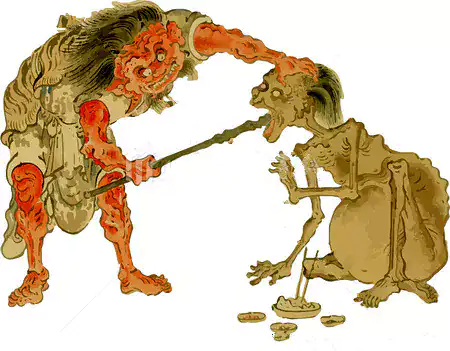
-
Save
"A deva explains the results of good actions and following precepts to a group of merchants lost in the desert."
The God Serissaka
Peta Vatthu 4.2 | Serissaka Sutta
A meeting took place between the deva Serissaka and some merchants. Please listen to this good story they told.
There was a king named Payasi in the city of Setavya. He was reborn as an earth deva. He lives happily in his mansion. That deva spoke to the merchants.
Deva:
Non-humans live in frightening forests and in deserts where there is little food, drink, and water. Your journey through this desert is very hard. You are about to die in the middle of this sandy place.
In this desert, there are no fruits, roots or any food or drink. There is no way to make a fire. There is only dust and scorching sand. This rough soil is like a scorched iron pot. It is like hell, without any happiness. This place has been haunted by ghosts for a long time. It seems that this land is under a curse of rishis. What are you seeking? Why have you come here? Is it because of greed, or fear, or have you gotten lost?
Merchants:
Dear Deva, we are merchants from the cities of Magadha and Anga. We travel with full carts to the cities of Sindhu and Sovira to earn money.
We could not stand the heat in the daytime. So, looking for a comfortable place for ourselves and out of compassion for our bulls, we rushed here to this place.
We took the wrong road in the night. We are lost and confused like blind men lost in a forest. We do not know where to go. We are stuck in the middle of this desert.
Deva, we have not seen anything like your mansion before. It is excellent. Because we have seen you, we are extremely happy. It is as if we have regained our lives.
Deva:
People travel to lands on the other side of the oceans. They travel through sandy deserts, over bridges made of canes and stakes, and to many more difficult places just to earn money. When you travel to different countries, what kind of things do you see and hear? I would like to learn about those strange things.
Merchants:
Deva, we have never seen or heard about any happiness greater than yours. Your happiness surpasses human happiness in every way. No matter how long we stare, we will never see enough of your mansion. There are pools in the sky with many white lotuses. The surrounding area is filled with trees that do not stop bearing fruit. Divine fragrance can be smelled everywhere. Your mansion is supported by hundreds of pillars made of beryl, crystals, corals, cat’s-eye, rubies, and brilliant jewels. There are golden stages decorated with golden railings. This mansion shines in gold and it is well designed with beautiful stairs. It is extremely beautiful.
There is lots of food and drink inside. Many goddesses play musical instruments and sing welcoming songs to entertain you. You enjoy being surrounded by these goddesses. The happiness you experience is beyond words. It is like the wonderful Nalini Palace of King Vessavana. Are you a god, a demon, the god Sakka, or a human? We merchants question you. Tell us who you are.
Deva:
Dear merchants, I am a deva. My name is Serissaka. I am the protector of this sandy desert. I was appointed by King Vessavana.
Merchants:
Deva, have you obtained these wonderful things by chance, have you created them yourself, or have other gods given them to you? How did you gain all these delightful things?
Deva:
Merchants, I did not obtain these wonderful things by chance, nor did I create them myself. Other devas did not give them to me. I have obtained these things as a result of my own meritorious deeds.
Merchants:
Dear Deva, what kind of religious activities did you perform and what kind of precepts did you follow? What kind of good deed did you do to gain these wonderful things?
Deva:
I was once a ruler in the country Kosala. My name was Payasi. I held the wrong view that there are no results of good and bad actions. I was very greedy and evil. I believed that nothing exists after death.
There was a great monk named Kumara Kassapa who knew the Supreme Buddha’s Dhamma well and could preach skillfully. One day, that monk taught me the Dhamma. That was the day he removed my terrible wrong views.
After hearing his sermon, I became a lay follower of the Supreme Buddha. I abstained from killing beings, stealing, drinking alcohol, lying, and was content with my own wife. That was my religious life and those were the precepts I followed. Due to those meritorious deeds, I obtained this wonderful mansion.
Whatever teaching has been preached by the wise is true. Those teachings are not false. Good doers enjoy the results of their actions wherever they go. Evil doers experience grief, crying, and misery wherever they go. They will never escape from falling into miserable worlds.
At that moment, the assembly of devas suddenly became very frightened and sad.
Merchants:
Dear Deva, what happened to you and your fellow devas? Why do you suddenly seem sad?
Deva:
Dear merchants, can you see these flowering Mahari trees in this forest spreading divine fragrance and dispelling darkness? After every hundred years, one petal of each flower falls off. That indicates that we devas have been here for one hundred years. I will stay in this mansion only for five hundred years. I know that very well. By then, my life span and merit will be spent. That is why I am very sad.
Merchants:
Dear Deva, having obtained a wonderful, long lasting mansion like yours, what is the point of being sad? If someone has a short lifespan and little merit, it makes sense for them to be sad.
Deva:
Dear merchants, you advised me using pleasing words with good hearts. I will protect you. You will be able to go safely to your destination.
Merchants:
We wish to go to the cities of Sindhu and Sovira to earn money. We promise that we will organize a huge ceremony in the name of Serissaka with lots of gifts.
Deva:
Do not organize ceremonies for me. You will get everything you wish for without having to reward me. Stop doing evil deeds and lead a virtuous life.
There is a lay follower of the Buddha in your group. He is very faithful, virtuous, generous, wise, and well behaved. He is learned in the Dhamma. He is a very happy lay follower with deep wisdom.
He does not tell lies intentionally. He does not even think to kill beings. He does not try to break others’ friendships, and he speaks beneficial things wisely. He is very disciplined, obedient, and established in higher virtue. He respects elders and looks after his parents. He has great noble qualities. I think he earns money just to take care of his parents, not to make himself rich. He intends to be a monk after his parents pass away.
He is straight, not crooked, and not deceitful. How could he experience suffering since he is well established in good qualities?
It is because he was in your group that I appeared before you. Therefore, merchants, following the Dhamma is the best protection. If you had come without that lay follower, you could have been destroyed by disasters in this desert like confused blind men. Association with good people is indeed a blessing.
Merchants:
Deva, please tell us, who is that person? What is his name? What is his role among us? We agree that if you appeared here out of compassion for someone, his company is truly a blessing.
Deva:
Yes, he is a servant of yours. He is your barber, Sambhava. He earns money shaving and cutting people’s hair. Recognize him as that lay follower. He is a very quiet person. Don’t look down upon him.
Merchants:
Dear Deva, we know who you are talking about. We never thought he was such a person. Having heard your praises, we are ready to worship him.
Deva:
Everybody traveling with you – elders, youth, children, and anyone who is greedy, come inside my mansion and see well the results of merit.
Placing the barber in the front, they all rushed behind him saying, “I am next! I am next!” They went inside the mansion as if entering the wonderful palace of the god Sakka.
When it was time to go for refuge, they all cried, “Let me go first!” wanting to become lay disciples of the Supreme Buddha. They abstained from killing, stealing, drinking alcohol, lying, and were content with their own wives. Everyone rejoiced in taking refuge in the Triple Gem. They rejoiced again and again enjoying divine wonders.
Afterwards, they went to Sindhu and Sovira safely and accomplished their goal of making lots of money. They eventually returned to their home city of Pataliputta safely. They went to their own houses, rejoined their wives and children, and organized a great festival called Serissaka. They delighted in this festival together with their families. They also built an assembly hall called Serissaka.
This is the result of association with noble friends, people who practice the Dhamma. Because of a single lay follower a large group of people benefited.
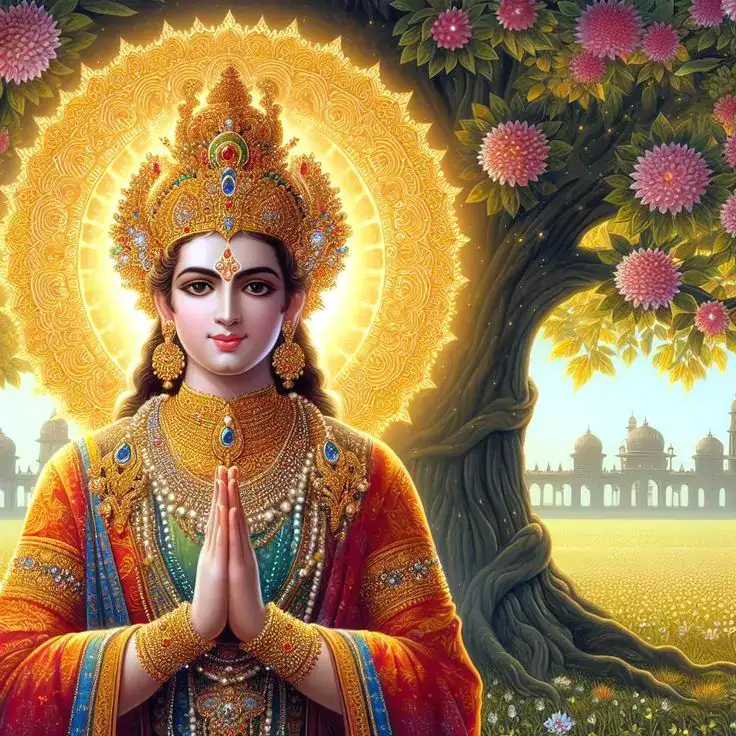
-
Save
"A ghost advises a king on the dangers of wrong views and the importance of taking refuge in the Triple Gem"
The Ghost Nandaka
Peta Vatthu 4.3 | Nandaka Sutta
There was a kingdom called Surattha which had a king named Pingalaka. One day, the king went to help King Moriya. Once he was done, King Pingalaka headed back home in the middle of the day. At that time the weather was very hot. Suddenly a path appeared, created by ghosts. The king saw that beautiful path. Unaware of the ghosts who created that path, he addressed the driver,
King:
Driver, that road is beautiful, safe, and peaceful. Please go and follow that road, it will lead us back to Surattha faster.
The king along with his army entered the path and followed it for a while. All of a sudden, one of the soldiers let out a terrifying scream,
Soldier:
Great King, we have taken the wrong path which is scary and hair-raising! We can see the road ahead, but there is no road behind us. I think we have come to an area where ghosts live. The smell of ghosts is thick, and frightful screams can be heard.
The king was afraid and said to the driver in a terrified voice,
King:
Driver, we have taken a wrong path which is scary and hair-raising. We can see the road ahead, but there is no road behind us. I think we have come to an area where ghosts live. The smell of ghosts is thick, and frightful screams can be heard.
Suddenly, the king climbed up on the back of his elephant and looked carefully at the surrounding. He saw a huge banyan tree that provided lots of shade. It looked very beautiful, like a blue cloud.
King:
Driver, look at that! What is that huge thing that looks like a blue cloud?
Driver:
Great King, it is a banyan tree with lots of shade.
The king approached the huge banyan tree and climbed down off his elephant. He and his ministers went to the tree and sat down in the shade. There was a pot filled with water and some sweet oil cakes. Suddenly, a being wearing beautiful jewelry like a god appeared in front of the king and said,
Ghost:
Welcome great King. Your arrival is a blessing. Please drink this water and eat these cakes.
The king with his ministers ate the oil cakes and drank the water. He then questioned the person,
King:
Are you a god, a heavenly musician, or Sakka, leader of the gods? Please tell us who you are.
Ghost:
Great King, I am not a god or a heavenly musician or Sakka, leader of the gods. I am a ghost. I came here from the state of Surattha.
King:
When you were in the human world, what kind of good deeds did you do? How did you gain this divine power?
Ghost:
Listen to me, great King, ministers, and soldiers. I was an evil person from the state of Surattha. I held wrong view, behaved badly, and was very greedy. I insulted others. I stopped people from doing good deeds. I did not let others practice generosity. I held the following wrong views:
- There is no result of giving.
- There is no result of following precepts.
- There are no people called teachers in this world.
- It is impossible for an untamed person to help others.
- All beings are equal.
- There is no point in respecting elders.
- Nothing can be achieved by making effort.
- There is no need to develop energy.
- No one can be purified through good deeds.
- Beings experience happiness and suffering due only to natural law.
- One’s mother is not a special person. There is no need to be grateful and respect her.
- One’s father is not a special person. There is no need to be grateful and respect him.
- There is no such thing as a brother and sister.
- There is no rebirth after death.
- Supporting and helping others and collecting merits do not give result.
- If someone beheads another, it does not count as killing. It is only putting a sword through the parts of a body.
- The soul of life can never be destroyed. It is like a ball that is five hundred kilometers high. Just like a ball of thread unwinds itself when thrown, it will only keep rolling as long as there is thread. This life is also like that.
- Just like somebody goes from one village to another or from one house to another, this soul goes from one body to another.
- Regardless of whether one is wise or a fool, everyone has to wander in this samsara for eighty-four hundred thousand great eons. Only then would one end this great suffering. It is like the happiness and suffering of beings has been measured from a bucket. There is a limit of how much suffering and happiness a being can receive.
Only realized people understand these things, everyone else is deluded. I held such wrong views in the past. I was so deluded and covered by ignorance. I committed evil deeds, was very greedy, and insulted others.
Six months from now, I will die and fall to the fearful and terrible hell. That hell has four corners, four doors, and is divided into sections. It is encircled by an iron wall with a roof of iron above. It is covered by burning flames for hundreds of miles.
Great King, the complete lifespan of beings in that hell is one trillion (1,000,000,000,000) years. Once they have suffered one hundred thousand years, suddenly they hear a strange sound. This is how they know they have suffered for one hundred thousand years. People who held wrong views, committed evil deeds, and insulted noble ones are boiled in hell for one trillion years. I am destined to suffer in that hell.
That is why I am extremely sorrowful.
Great King—the one who overcomes his enemies and develops his kingdom—may my blessings be with you. Please listen to me great King. My daughter’s name is Uttara, she is still in the human world. She protects the five precepts throughout her life and observes eight precepts four times a month. She is not greedy, but instead very generous. She offers alms and leads a very restrained life. She is very humble towards others and always uses pleasant words. Like this she does lots of meritorious deeds.
Most importantly, she is a lay disciple of the Sakyan sage, the glorious Gautama Supreme Buddha.
Just now a virtuous monk, mindful, with his eyes looking down approached the village where she lives. That monk was going from house to house begging for food. Great King, I am very fortunate that my daughter saw that monk. She offered some water and a sweet oil cake to the monk and dedicated the merit to me saying, “Bhante, my father has passed away. May he receive this merit.” At that very moment, I received the result of that merit. Now I enjoy wonderful things here, just like Vessavana, the king of gods.
Great and powerful King, listen to me. In this world with its gods, the greatest being is the Supreme Buddha. You, along with your wife and children, should go for refuge to the Supreme Buddha. The Noble Eightfold Path is the only way leading to Nibbana, the end of suffering. You should go for refuge to the Dhamma. The community of monks is very virtuous, well concentrated, and wise. They are the disciples of the Buddha. The Sangha consists of eight individuals and four pairs of persons. Go for refuge to that Sangha.
Abstain from killing beings right now, stop stealing, do not take intoxicating drinks and drugs, do not tell lies, and be satisfied with your own wife.
King:
Yes, I will take refuge in the Buddha, Dhamma, and Sangha right now, and place confidence in the Triple Gem. I will stop killing beings right now, I will stop stealing, I will not take intoxicating drinks and drugs, I will not tell lies, and I will be satisfied with my own wife.
Just as hay is carried away by strong wind and grass is carried away by the current of a stream, I vomit up my wrong views right away. I have true confidence in the teachings of the Buddha.
Saying this, the king stopped doing bad deeds. He worshipped the Supreme Buddha, got on to his carriage, and headed east towards his kingdom.
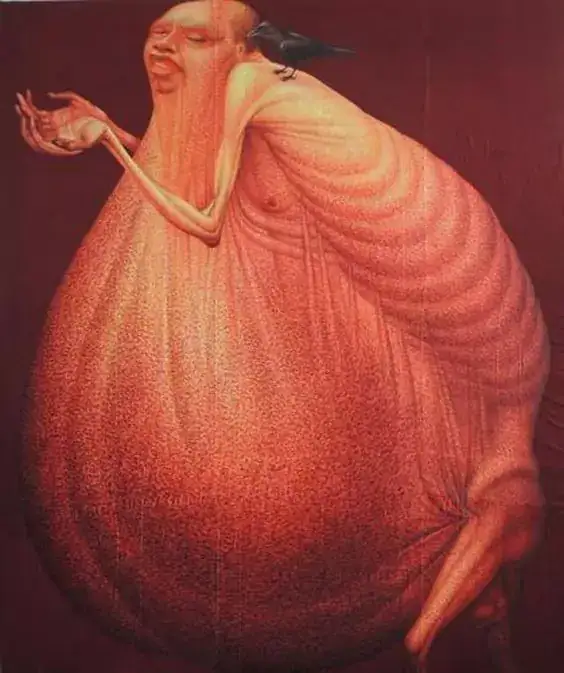
-
Save
